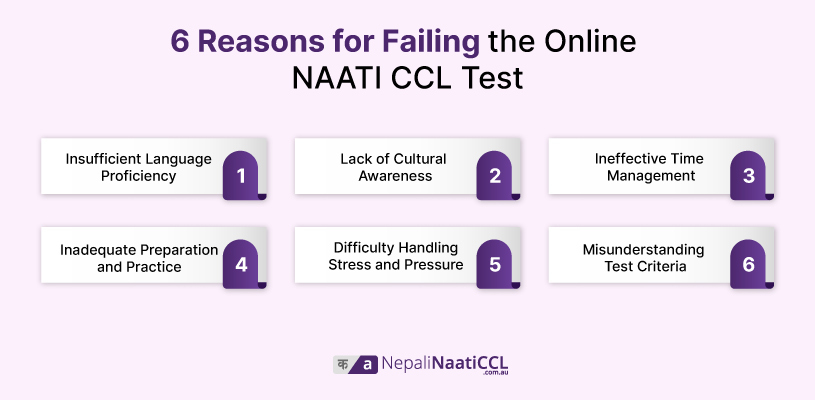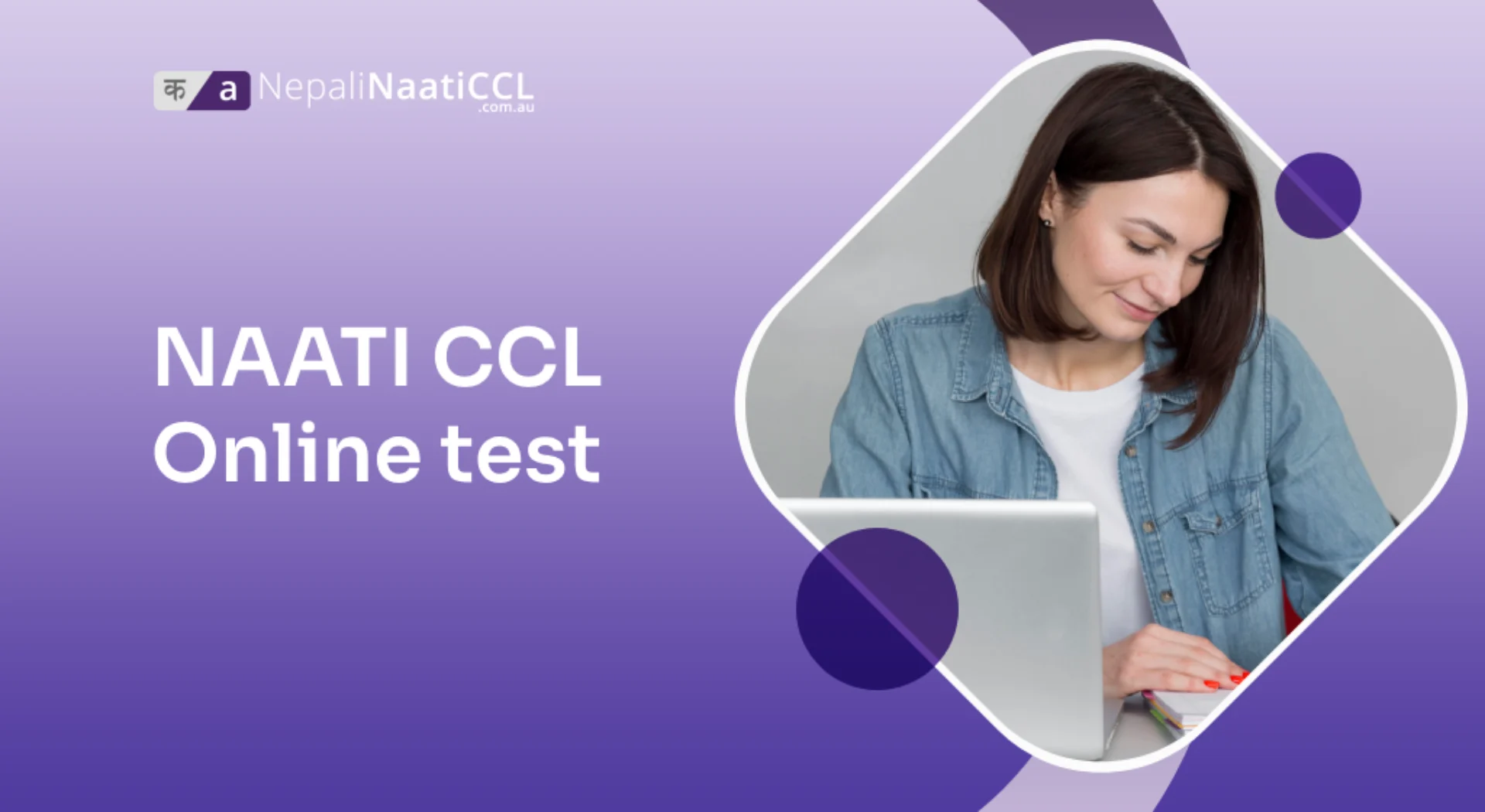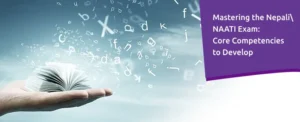Language barriers have often hindered seamless interactions between individuals from diverse linguistic backgrounds, as effective communication has become a crucial aspect of daily life in our increasingly globalized society. Hence, to address this challenge, the NAATI CCL online test has been gaining popularity as a viable pathway for aspiring interpreters to gain official accreditation and immigration pathways.
After the COVID-19 pandemic, NAATI responded to the changing landscape by transitioning the CCL test from in-person to a fully accessible online format, ensuring continuity and accessibility.
The NAATI CCL Test is a crucial entry point for language enthusiasts seeking a career in interpreting across various sectors, including healthcare, legal, educational, and community services.
Through its evaluation of language proficiency and cultural understanding, the test empowers individuals to pursue rewarding careers in interpreting and provides five crucial Australian PR points.
Let’s explore more on the subject of the NAATI CCL Online Test.
How will the NAATI CCL Online Test be conducted?
The NAATI CCL Online Test is a secure and controlled examination taken on the Internet. To participate, you must register on the official NAATI website and choose a suitable date and time for the test.
The NAATI CCL test will be conducted using the software known as ProctorExam. You must require a microphone and a camera on your computer to appear on the exam. Your phone will be used as a second camera to record your environment. You’ll need to download the ProctorExam application (34MB), compatible with Android 4.1 or higher and iOS (Apple) 10.0 or higher.
Before starting the test, you should always ensure a stable internet connection, a computer or laptop, and the necessary software to perform the test. Furthermore, to maintain fairness and verify the candidates’ identity, there are procedures for identity verification. Video conferencing may ask candidates to show identification documents and confirm their identity.
Likewise, you need to interpret these dialogues accurately and smoothly. The test evaluates your language skills and understanding of different cultures. Also, the dialogues cover various topics to assess your performance thoroughly.
The test interface is user-friendly and straightforward. You can listen to the dialogues, pause or replay if needed, and provide their interpretations. However, your primary focus should be to manage your time well to complete all the tasks within the specified time limit.
After the test, NAATI assessors review the candidates’ interpretations. They primarily consider accuracy, fluency, and adherence to the NAATI CCL Test criteria. The results are usually available on the NAATI website within 8 to 10 weeks, and candidates can access their scores there.
Moreover, It’s essential to remember that the NAATI CCL Online Test procedures might change at any time, so you should check the latest information on the official NAATI website or contact NAATI directly before taking or even preparing for the test.
8 Tips and Expert Strategies for the NAATI CCL Online Test

If you want to successfully prepare and clear the NAATI CCL Online Test, you will require a combination of language proficiency, cultural awareness, and effective interpreting skills.
To help you excel in your NAATI CCL online test preparation, here are eight expert strategies and tips:
1. Master Your Languages
You must be proficient in English and your chosen Language Other Than English (LOTE) to excel in the NAATI CCL Online Test. Also, practicing regularly by reading, writing, listening, and speaking in both languages will help you immensely.
Practicing regularly will improve your fluency and confidence. It will also help you immerse yourself in the culture associated with your LOTE, enhancing your understanding of cultural nuances and improving your interpreting accuracy.
Also, build a solid foundation in the languages you’ll be tested on, ensuring you understand the nuances and intricacies of each. This mastery will empower you to express ideas clearly and accurately during the test.
Furthermore, pay attention to common topics that frequently appear in the NAATI CCL test. This might include discussions about daily routines, hobbies, or workplace scenarios.
By familiarizing yourself with these themes, you’ll be better equipped to handle the test’s content, showcasing your linguistic proficiency effectively.
2. Develop Cultural Understanding
Understanding the culture of your chosen LOTE is crucial for accurate interpretation. Engage with native speakers, watch movies, read books, and consume media in that language.
Developing a deep understanding of cultures goes beyond linguistic proficiency and involves appreciating the cultural nuances. In at least four paragraphs, I’ll elaborate on the importance of cultural understanding and how it can be developed.
For instance, understanding the cultural connotations of certain words or phrases helps you avoid potential misunderstandings, contributing to more straightforward and more precise communication.
One effective way to develop cultural understanding is through immersive experiences. Surround yourself with authentic materials, such as literature, movies, or music from the cultures associated with the languages in the test.
This exposure provides insights into cultural expressions, idiomatic usage, and social norms, enhancing your ability to navigate the diverse contexts presented in the NAATI CCL test.
Moreover, engage in conversations or discussions with native speakers whenever possible.
3. Practice Active Listening
Active listening involves fully concentrating, understanding, responding, and remembering what is being said. To develop this skill, regularly listen to various dialogues and speeches in both English and your LOTE.
Also, it is a crucial skill that can significantly enhance your performance in the NAATI CCL test. It involves not just hearing the words but genuinely understanding their meaning.
Likewise, a practical way to practice active listening is through regular exposure to spoken language in diverse contexts. Listen to podcasts, interviews, or conversations in the languages relevant to the NAATI CCL test.
This exposure sharpens your listening skills and exposes you to different accents, speech patterns, and pacing, preparing you for the scenarios you might encounter in the test.
Additionally, when practicing with mock tests or language partners, focus on the words being spoken and the overall message and intent. Train yourself to identify critical information, infer meaning from context, and respond appropriately.
4. Develop Note-Taking Techniques
Note-taking can be a valuable aid during the test. Practice taking concise and relevant notes while listening to dialogues.
Given the time constraints and the need for quick responses, well-organized notes allow you to recall pertinent information promptly. This skill is particularly crucial when remembering specific details from a conversation or dialogue.
One proper note-taking technique is to focus on keywords and main ideas. Instead of trying to transcribe every word, jot down key terms or phrases that capture the essence of the information.
Additionally, practice selective listening and note-taking during mock tests or practice sessions. Train yourself to identify the most crucial information and record it in a structured manner.
5. Simulate Test Conditions
You can replicate test conditions by creating a mock test environment at home. Use sample NAATI CCL test materials or practice exams available online.
By replicating the actual testing environment, you can familiarize yourself with the format, time constraints, and overall expectations. Also, by creating such an environment, you can learn about the eligibility Criteria for the NAATI CCL Test and acclimate yourself to the time constraints.
Additionally, recreate the testing environment as closely as possible. Choose a quiet space, eliminate distractions, and use the same tools or equipment you’ll have during the actual test. This immersive experience enhances your ability to concentrate, reinforcing your preparedness for the actual test conditions.
Moreover, seek feedback on your simulated performances. If possible, involve a language expert or tutor who can assess your responses and provide constructive insights to enhance your readiness for the NAATI CCL test.
6. Diversify Topic Familiarity
Expanding your familiarity with diverse topics is a smart strategy for excelling in the NAATI CCL test. Being well-versed in various subjects enhances your ability to handle varied conversations during the test.
This versatility showcases your linguistic competence across different domains, a critical factor in performing well on the test. Likewise, one effective way to diversify topic familiarity is through regular reading across various genres and industries.
Additionally, engage in discussions or conversations with language partners or peers on different subjects. This interactive approach lets you practice expressing ideas coherently and confidently across various topics.
Moreover, ensure that your preparation includes scenarios from different domains, testing your ability to adapt quickly to new subjects. This targeted practice enhances your overall readiness for the range of topics encountered in the NAATI CCL test.
7. Seek Feedback and Guidance
Another essential thing is to collaborate with experienced language instructors or join study groups to receive constructive feedback on your interpretations.
Seeking feedback and guidance is a valuable step in refining your skills for the NAATI CCL test. Constructive input from experienced individuals can provide insights, identify areas for improvement, and enhance your overall performance.
Hene, engage with native speakers or individuals proficient in the languages tested in NAATI CCL. Their feedback on your language usage, pronunciation, and overall communication style can provide valuable insights for improvement.
Additionally, consider involving experienced tutors or mentors who specialize in NAATI CCL test preparation. Their expertise allows for targeted feedback tailored to the test’s requirements.
Similarly, use mock tests as opportunities to receive feedback. Review your responses after completing a practice test and seek input from language experts or tutors. This iterative process ensures continuous improvement in preparation for the NAATI CCL test and offers guidance on steps to make NAATI CCL successful.
8. Stay Calm and Composed
On the test day, remain calm and composed. Manage your time efficiently to ensure you have ample time for each dialogue. If you encounter a challenging dialogue, stay focused and composed.
Also, the pressure of the test environment can impact performance, making it essential to stay collected and focused. Hence, practice deep breathing exercises or meditation to center your thoughts and manage stress.
These techniques can be beneficial during your study sessions and when approaching the test, fostering a sense of calmness that enhances your overall performance.
Moreover, establish a routine for relaxation before the test day. Engage in activities that help you unwind, whether listening to calming music, taking a short walk, or engaging in a favorite hobby. This pre-test relaxation routine sets a positive tone, contributing to a more composed mindset when entering the test environment.
6 Reasons for Failing the Online NAATI CCL Test

Failing the Online NAATI CCL Test can be disheartening, but the common reasons behind it can help aspiring NAATI CCL test takers avoid common mistakes, strategize and improve their performance for their upcoming NAATI CCL test.
The following are the six key reasons why candidates may fail the test:
1. Insufficient Language Proficiency
One of the primary reasons for failure is inadequate language proficiency in either English or the chosen Language Other Than English (LOTE).
A solid grasp of vocabulary is essential for effective communication in the NAATI CCL test. This involves knowing the right words to express ideas and thoughts accurately.
Additionally, understanding the grammar and sentence structures in both languages is vital. It ensures that responses are linguistically correct and convey the intended meaning clearly.
Likewise, cultural nuances play a significant role in language proficiency. Understanding cultural contexts, expressions, and idioms makes interpreting and responding appropriately during the test easier.
The NAATI CCL test often involves scenarios with cultural references, and lacking this proficiency may lead to misunderstandings and inaccuracies in communication.
To address insufficient language proficiency, engage in activities that enhance vocabulary, such as reading books and articles or watching movies in both languages. This exposure helps in understanding how words are used in different contexts.
2. Lack of Cultural Awareness
Effective interpreting requires more than just language skills; it demands cultural awareness and sensitivity.
Candidates who need help understanding the cultural nuances in the dialogues may misinterpret context-specific expressions or need clarification on the underlying meaning. Hence, cultural awareness is crucial because language is deeply intertwined with a particular culture’s customs, expressions, and societal norms.
In the context of the NAATI CCL test, having an awareness of these cultural nuances is essential for accurately interpreting and responding to the scenarios presented. However, It is not solely about linguistic correctness but also about conveying ideas that align with the cultural expectations of the languages.
To overcome the lack of cultural awareness, candidates should engage in activities that expose them to authentic cultural materials. Reading literature, watching movies, or listening to native speakers in both languages can provide valuable insights into cultural expressions and practices.
3. Ineffective Time Management
The NAATI CCL Test is time-constrained, and you must interpret multiple dialogues within a set timeframe. Also, good time management can result in complete interpretations or timely responses, affecting the overall quality of the performance.
Effective time management is critical because the NAATI CCL test is designed to assess the ability to respond promptly in real-world scenarios. Also, failing to manage time effectively can lead to incomplete or rushed answers, impacting the overall quality of communication.
To address ineffective time management, candidates should regularly practice timed exercises and mock tests. Setting a timer during practice sessions can simulate the test environment and provide valuable insights into individual time management habits.
Additionally, it is crucial to prioritize responses based on the allocated time. Understanding the weightage of each section and allocating time accordingly ensures that candidates can provide well-thought-out responses without the pressure of rushing toward the end of a section.
4. Inadequate Preparation and Practice
Lack of sufficient preparation and practice can significantly impact performance. Candidates who do not engage in mock tests, practice dialogues, or seek feedback on their interpreting skills may find adapting to the test’s format and requirements challenging.
To begin with, adequate preparation is essential to familiarize oneself with the test format, expectations, and scenarios that one may encounter.
Without thorough preparation, candidates may find themselves unprepared to handle the dynamic nature of the test, leading to challenges in communication.
Moreover, regular and focused practice is paramount for honing language skills and adapting to the test’s time constraints. Mock tests provide a simulated test environment, allowing candidates to identify areas of weakness and refine their strategies.
Also, Inadequate practice can result in difficulty managing time effectively, understanding cultural nuances, and responding promptly during the test.
To address the issue of inadequate preparation and practice, candidates should create a structured study plan that includes regular practice sessions with mock tests. Additionally, seeking feedback from language experts or tutors is valuable.
5. Difficulty Handling Stress and Pressure
Test anxiety can hinder performance and cause candidates to underperform during the examination. Nervousness and stress may affect their ability to concentrate, leading to errors in interpreting and reduced overall performance.
Moreover, stress can affect both linguistic and cognitive functions. It may lead to difficulties recalling vocabulary, understanding questions, and organizing thoughts coherently.
In a test where quick thinking is vital, stress can hinder the ability to navigate scenarios easily.
Also, positive visualization can be a powerful strategy. Envisioning successful outcomes and confident performance in various test scenarios can help build a positive mindset.
This mental preparation contributes to a more resilient approach when faced with the stressors of the test environment. Engaging in activities that help unwind, such as listening to calming music or taking a short walk, can set a positive tone before entering the test environment.
A relaxed mind contributes to better focus and a more composed demeanor during the test.
6. Misunderstanding Test Criteria
Finally, failing to grasp the specific criteria and expectations of the NAATI CCL online test can be a problem. Candidates may not align their interpretations with the criteria requirement, resulting in an unsatisfactory performance.
Misunderstanding the test criteria can pose a significant challenge for candidates taking the NAATI CCL test. Moreover, the test evaluates candidates based on predefined parameters such as vocabulary, grammar, cultural appropriateness, and response coherence.
Misinterpreting these criteria can result in focusing on specific aspects while neglecting others. For example, solely emphasizing linguistic correctness without considering cultural nuances may lead to incomplete communication.
To overcome the challenge of misunderstanding test criteria, candidates should thoroughly review the official guidelines provided by NAATI. Familiarizing oneself with the assessment criteria for each test section is crucial.
Additionally, seeking guidance from experts or tutors familiar with the NAATI CCL test criteria is beneficial. They can provide insights into the nuanced expectations of the test and offer feedback on aligning responses with the specified criteria.
NepaliNAATICCL for Online NAATI CCL Test
To help you succeed in the online NAATI CCL test and to prepare effectively, choosing NepaliNAATICCL can play out to be an excellent option. NepaliNAATICCL is a platform to assist Nepali-speaking candidates in their NAATI CCL test preparation journey.
Furthermore, the e-learning portal offers valuable resources, study materials, and free NAATI CCL test samples, making it an invaluable resource for aspiring NAATI CCL online test takers.
NepaliNAATICCL provides premium NAATI CCL study materials and practice tests in English and Nepali languages which helps candidates to strengthen their language skills and improve their interpreting abilities.
Also, by practicing with the free NAATI CCL test samples available on the platform, candidates can familiarize themselves with the test format, gain insights into the types of dialogues typically presented, and assess their performance under timed conditions.
Moreover, NepaliNAATICCL offers a supportive community of like-minded individuals preparing for the NAATI CCL test. Engaging with this community allows candidates to seek advice, share experiences, and receive constructive feedback, fostering a conducive learning environment.
Hence, by utilizing these valuable resources, candidates can maximize their chances of success in the NAATI CCL test and embark on a fulfilling career as interpreters or earn five Australian PR points.
Conclusion
In conclusion, the NAATI CCL Online Test is in itself a significant opportunity for language enthusiasts to gain official accreditation and pursue careers as interpreters or immigrate to Australia.
Likewise, the NAATI CCL Online Test is a critical gateway; however, success in this test requires a definitive approach, proper tips, and expert strategies.
Furthermore, the transition of the NAATI CCL test to an online format after the COVID-19 pandemic showcases the adaptability and innovation of the language assessment landscape.
Also, the CCL Online Test remains vital in encouraging cross-cultural communication as we continue navigating the ever-changing landscape of multilingual interactions.
Happy Learning!!
FAQ
Q.1: What is the purpose of the NAATI CCL Online Test?
The NAATI CCL Online Test assesses candidates’ abilities to interpret dialogues between English and a Language Other Than English (LOTE). The test evaluates your language proficiency and cultural understanding, ensuring they have the necessary skills to work as accredited interpreters across various sectors.
Q.2: How long is the NAATI CCL Online Test, and what does it consist of?
The NAATI CCL Online Test typically takes about 1.5 to 2 hours. It includes multiple English and the chosen LOTE dialogues, covering various topics. Also, test candidates must interpret these dialogues accurately and fluently within a specific time limit.
Q.3: What are the benefits of obtaining NAATI CCL accreditation?
Earning NAATI CCL accreditation opens doors to many opportunities as a professional interpreter. It allows individuals to work in healthcare, education, law, and community services, facilitating communication between speakers of different languages and promoting cross-cultural understanding.
Q.4: Can I take the NAATI CCL Online Test from any location?
Yes, the NAATI CCL Online Test can be taken from any location with a stable internet connection. After the Covid-19 pandemic, candidates can sit for the test from the comfort of their homes, ensuring flexibility and accessibility.
Q.5: What resources are available to help with NAATI CCL test preparation?
There are various resources available to assist with NAATI CCL test preparation. Candidates can find study materials, practice exams, and sample dialogues online. Platforms like NepaliNAATICCL offer resources for specific language communities, helping NAATI CCL test candidates refine their skills and boost their confidence before the examination.





